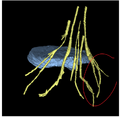Difference between revisions of "2011 Summer Project Week NerveSeg"
| Line 10: | Line 10: | ||
<gallery> | <gallery> | ||
Image:NergeSeg-scr1.png|Figure 1 - Example of Manual Nerve Segmentation | Image:NergeSeg-scr1.png|Figure 1 - Example of Manual Nerve Segmentation | ||
| + | |||
Image:NerveSeg-scr3.png|Figure 2 - Example_1: non-cleaned results. | Image:NerveSeg-scr3.png|Figure 2 - Example_1: non-cleaned results. | ||
| − | Image:NerveSeg-res-scr1.png|Figure 3 - | + | |
| − | Image:NerveSeg-res-scr2.png|Figure 4 - Complete render of nerve segmentations. | + | Image:NerveSeg-res-scr1.png|Figure 3 - Example_2: Automatic segmentation for multiple nerves. Right nerve is uncleaned, Left nerve is run with a clean-up post-processing step. |
| − | Image:NerveSeg-res-scr3.png|Figure 5 - Another View. | + | Image:NerveSeg-res-scr2.png|Figure 4 - Example_2: Complete render of nerve segmentations. |
| − | Image:NerveSeg-mr.png|Figure 6 - | + | Image:NerveSeg-res-scr3.png|Figure 5 - Example_2: Another View. |
| − | Image:NerveSeg-map.png|Figure 7 - | + | |
| + | Image:NerveSeg-mr.png|Figure 6 - Example_3: Another example, following several nerve bundles. | ||
| + | Image:NerveSeg-map.png|Figure 7 - Example_4: A map of several automatically segmented nerves with herniated disc manually segmented. | ||
</gallery> | </gallery> | ||
Revision as of 18:43, 17 June 2011
Home < 2011 Summer Project Week NerveSegNerve Segmentation
Key Investigators
- MIT: Adrian Dalca, Polina Golland
- BWH: Giovanna Danagoulian, Ehud Schmidt
- SPL: Ron Kikinis
Objective
We are developing a nerve segmentation algorithm for the automatic isolation of nerves and nerve ganglia inside the spinal sack and out through the vertebrae in new MR Myelography images. Current progress can track the core of a Nerve, and we are working on fully segmenting the edges.
Approach, Plan
Currently we use a particle-filter tracking approach for segmenting the nerves. The algorithm is given a seed point, preferably somewhere in the spine. The particles are tubes following Bézier curves (and hence forming a B-spline track). The dynamics model encourages continuity and smoothness. The image likelihood model compares gradient fields and intensities of predicted patches with image observations to evaluate a posterior distribution of the particles' importance. While we can currently usually track the nerve cores, usually fully throughout the vertebral canal, the algorithm does not delineate the full extent of the nerves. We will focus on achieving this during the project week.
Progress







